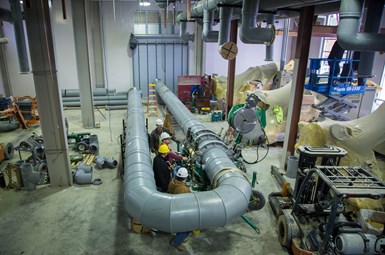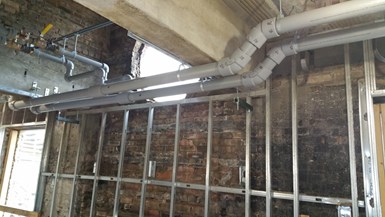New ASTM Standard Expected to Boost PP Piping Systems
Borealis’ PP random copolymer showing up in the first North American plumbing and industrial PP piping projects.

From small plumbing installations to large industrial pipe systems, an innovative PP random copolymer with improved temperature resistance from Austria’s Borealis Group (U.S. office in Port Murray, N.J.) is expected to get a lot of play in North America, thanks to a new ASTM standard.
Pressure-rated PP piping systems have long been standardized in other parts of the world, and have built up a solid track record over the past 30 years. Borealis has used its ‘Value Creation through Innovation’ strategy to develop and pioneer new PP-RCT solutions for exceedingly demanding pipe applications and chlorine-resistant crosslinked polyethylene (PEX) specifically for North American market requirements.
Compared to conventional materials like steel and copper, Borealis’ Niron PP-RCT reportedly offers significant advantages. The new ASTM F2389-17a standard, published in January 2017, makes it easier for North American engineers and builders to select thermoplastic piping systems as replacement solutions for traditional materials. Advantages of thermoplastic piping systems like PP-RCT include:
- Thermal fusion joining, leak-tight pipe fusion
- High corrosion resistance
- Easy installation and minimal maintenance
- Long lifetime with improved environmental impact
- Downgauging potential and higher hydraulic capacity than traditional PP-R
Borealis has leveraged its global market reach and materials expertise to actively contribute to the development of the new ASTM standard. In partnership with both its European and North American customers, it has also contributed to the realization of the first PP-RCT projects in plumbing and industrial applications in North America. Two recent ventures exemplify the broad range of application of PP-RCT:

Borealis and systems supplier ISCO Industries, Huntsville, Ala., made PP-RCT history with the largest PP-RCT project to date in the U.S. for chilled water and condenser lines inside a newly-built mechanical room. Originally designed to use steel pipes, ISCO reconfigured the plan for the new chiller plant at South Dakota State University to use large-diameter PP-RCT pipes instead, including the first-ever 24-in. PP-RCT pipe.
Borealis worked with Houston-based Nupi Americas in a project in Illinois to install PP-RCT in an existing elderly-care facility. Niron PP-RCT was used for hydronic installation to re-pipe and ageing system, and for a replacement cooling tower and other equipment.
It is no surprise that Borealis is making more of a splash in North America. Just last June, it announced that it has plans to build a dedicated automotive PP compounding plant in Taylorsville, N.C. Scheduled to come on stream in early 2019, initial production will consist of PP compounds in the Daplen family of TPOs and in the Fibremod range of short galss fiber (SGF).
Related Content
-
Plastics Machinery Shipments Rose in 2022’s Final Quarter
The Plastics Industry Association’s (PLASTICS) Committee on Equipment Statistics (CES) reported that injection molding and extrusion machinery shipments totaled $432.7 million in Q4.
-
Nova Makes Senior Leadership Changes
The company’s aim is to bolster sustainability ambitions
-
Artificial Intelligence Enables Smarter Sourcing
Westfall Technik has adopted Arkestro’s predictive procurement software to wring savings and more reliable deliveries from a historically challenging supply chain.















